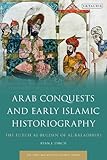Arab conquests and early Islamic historiography : the Futuh al-Buldan of al-Baladhuri / Ryan J. Lynch.
Material type: TextSeries: Early and medieval Islamic worldCopyright date: ©2020Description: 1 online resource (x, 254 pages)Content type:
TextSeries: Early and medieval Islamic worldCopyright date: ©2020Description: 1 online resource (x, 254 pages)Content type: - 9781838604417
- 1838604413
- 9781838604400
- 1838604405
- Balādhurī, Aḥmad ibn Yaḥyá, -892. Futūḥ al-buldān
- Futūḥ al-buldān (Balādhurī, Aḥmad ibn Yaḥyá)
- Islamic Empire -- History -- Sources
- Islamic Empire -- Historiography
- Empire islamique -- Historiographie
- Islamic studies
- History -- Middle East -- General
- Social Science -- Islamic Studies
- History -- Historiography
- Historiography
- Islamic Empire
- 909.0976710072
- BR45 L853 2020eb
- online - EBSCO
| Item type | Current library | Call number | URL | Status | Notes | Barcode | |
|---|---|---|---|---|---|---|---|
 eBook
eBook
|
Biblioteca "Angelicum" Pont. Univ. S.Tommaso d'Aquino Nuvola online | online - EBSCO (Browse shelf(Opens below)) | Online access | Not for loan (Accesso limitato) | Accesso per gli utenti autorizzati / Access for authorized users | (ebsco)2276988 |
Includes bibliographical references (pages [231]-247) and index.
Print version record.
Intro; Title Page; Copyright Page; Contents; Acknowledgements; Notes on primary source citation, translation, and transliteration; Illustrations; Figures; Maps; Introduction; The early Arabic historical tradition and the problematic nature of the 'narrative sources'; Ansāb al-ashrāf and Futūḥ al-buldān; Dating the text; The limitations of the Futūḥ and this research; Author, editor, compiler: The many professions of an early Muslim writer; The deliberate intention of the author: Historical analysis through textual analysis; Notes; Chapter 1: The text of Futūḥ al-buldān
The modern scholarly editionsThe surviving manuscript tradition of the Futūḥ; Notes; Chapter 2: The author and the context; The Biography of al-Balādhurī; Contextualizing the Futūḥ: Military transformation and the Turkish military crisis; The economic crisis of the ninth/third century; The fracturing of central authority; Kharāj, Amwāl, and Hikma: Writing the books that were needed; Notes; Chapter 3: The sources of Futūḥ al-buldān; Introductory words and the collective Isnād; Al-Balādhurī's use of Qāla as an introductory phrase in the Futūḥ
A most important informant: Al-Ḥusayn b. 'Alī b. al-Aswad al-'IjlīAbū 'Ubayd al-Qāsim b. Sallām and Kitāb al-Amwāl; Conclusions; Notes; Chapter 4: The content and themes of the text; Administering conquest: The conquest context and al-Balādhurī's presentation of history; Conquered status and settlement agreements; The exploitation of land and resources; Building projects and cities; Attitudes towards the Umayyads, the 'Abbāsids, and the caliphal office; Administrators on horses: Commanders, governors, and executive bureaucrats; Literary features of the Futūḥ
Poetry, the Futūḥ, and the early Arabic historical traditionConclusions; Notes; Chapter 5: The matter of genre and the classification of Futūḥ al-buldān; What's in a name? Medieval classifications of Futūḥ al-buldān; Futūḥ al-buldān as conquest literature; Futūḥ al-buldān as a legal text; Futūḥ al-buldān as administrative geography; Origins of a profession: Futūḥ al-buldān's 'appendices'; A unique time and place: The audience of Futūḥ al-buldān; Conclusions; Notes; Chapter 6: The medieval reception and reuse of the Futūḥ; Textual reuse and the Futūḥ: To cite or not to cite?
The where and what of Futūḥ reuseIbn al-Faqīh's Kitāb al-Buldān; Yāqūt's Mu'jam al-buldān; Ibn al-'Adīm's Bughyat al-ṭalab fī ta'rīkh Ḥalab; Ibn al-Athīr's al-Kāmil fi-l-ta'rīkh; Ibn 'Asākir's Ta'rīkh madīnat Dimashq; Qudāma b. Ja'far and Kitāb al-khāraj's Futūḥ section; Repetition and emendation: The common features of reused material; Conclusions; Notes; Conclusion: A portrait of authority; A different kind of history; An administrator's handbook; Notes; Bibliography; Primary sources; Secondary sources; Index
"Of the available sources for Islamic history between the seventh and eighth centuries CE, few are of greater importance than al-Baladhuri's Kitab Futu? al-buldan (The Book of the Conquest of Lands). Written in Arabic by a ninth-century Muslim scholar working at the court of the 'Abbasid caliphs, the Futu?'s content covers many important matters at the beginning of Islamic history. It informs its audience of the major events of the early Islamic conquests, the settlement of Muslims in the conquered territories and their experiences therein, and the origins and development of the early Islamic state. Questions over the text's construction, purpose, and reception, however, have largely been ignored in current scholarship. This is despite both the text's important historical material and its crucial early date of creation. It has become commonplace for researchers to turn to the Futu? for information on a specific location or topic, but to ignore the grander - and, in many ways, more straightforward - questions over the text's creation and limitations. This book looks to correct these gaps in knowledge by investigating the context, form, construction, content, and early reception history of al-Baladhuri's text."-- Provided by publisher.
Includes bibliographical references and index.


